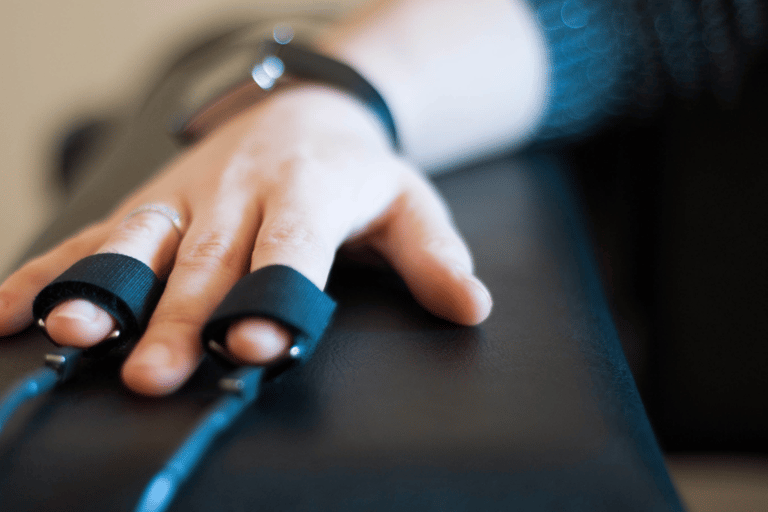Why get a Polygraph Test?
Resolve Disputes/Infidelity.
Polygraph tests can also be used to resolve disputes between individuals or organizations. For example, a polygraph test could be used to determine if a spouse is cheating on the other spouse or if a business partner is stealing from the company.
Investigate Suspected Crimes.
To Provide Peace of Mind.
Polygraph tests are also used by law enforcement to investigate suspected crimes. The test can help to identify individuals who may be involved in a crime, even if they are not willing to admit to it.
For some people, simply taking a polygraph test can provide peace of mind. If you are concerned that you may be lying about something, taking a polygraph test can help you to put your mind at ease.
Screen Potential Employees.
Polygraph tests are often used by employers to screen potential employees for honesty and trustworthiness. The test can help to identify individuals who may be prone to dishonesty or who may have a history of criminal activity. Polygraph testing for employment screening is primarily utilized by government and law enforcement agencies, including police departments, sheriff's offices, and federal agencies such as the FBI, CIA, NSA, DEA, and ATF. Corrections facilities, court systems, probation departments, and border patrol agencies also commonly require polygraph examinations as part of their hiring process to ensure the integrity and trustworthiness of personnel who will be handling sensitive information or working in high-security environments.
Million People in the United States Took a Polygraph Test
Million Civilians Took a Polygraph Test
Million Law Enforcement Took a Polygraph Test
Took a Polygraph Test to Resolve a Personal Issue
Took a Polygraph Test to Resolve an Infidelity Issue
Took a Polygraph Test for a Criminal Investigation
Took a Polygraph Test for an Employer Investigation
POLYGRAPH QUESTIONS AND HOW THEY WORK.


A polygraph examination (PE) does not go by the number of questions; it goes by the number of ISSUES.
No Polygraph Examination can test on more than four ISSUES.
As to the number of actual questions asked, I will ask the number of questions needed to resolve the
ISSUE.No examiner will test on four ISSUES.
Two or more ISSUES result in reduced reliability, and the rule requires the examinee to pass all ISSUES, or they pass no part of the PE.
I will not test on more than two, but I dislike even
testing on two.
THE MOST POPULAR POLYGRAPH QUESTIONS
How accurate are polygraph tests?
Polygraph tests are generally 85-95% accurate when administered by trained professionals. However, accuracy can vary based on the examiner's skill, equipment quality, and the subject's physical/mental state.
Can you beat a polygraph test?
While some claim there are ways to manipulate results (controlled breathing, mental exercises), modern polygraphs are designed to detect countermeasures. The best approach is simply being truthful.
What do polygraph tests detect?
Polygraphs measure physiological responses: heart rate, blood pressure, breathing patterns, and skin conductivity. These typically change when someone is deceptive due to stress responses.
How much does a polygraph test cost?
Private polygraph exams typically range from $350-$1800, depending on location, complexity, and examiner credentials. Employment screenings may be covered by employers.
Are polygraph tests admissible in court?
In most U.S. states, polygraph results aren't admissible in court but are used. However, they're widely used for employment screening, especially in law enforcement and government positions.
How long does a polygraph test take?
A complete polygraph examination usually takes 2-4 hours, including pre-test interview, actual testing (30-60 minutes), and post-test discussion.
What should I expect during a polygraph test?
Expect a pre-test interview, attachment of monitoring equipment, review of questions, the actual test with yes/no questions, and a post-test discussion of results at the examiner's discretion.
How to prepare for a polygraph test?
Get adequate sleep, avoid alcohol/drugs, arrive early, dress comfortably, and most importantly - be completely honest. Don't try to "beat" the test.
What questions are asked in a polygraph test?
Questions are typically yes/no format, including control questions (baseline), relevant questions (case-specific), and irrelevant questions (neutral topics like your name).
Can medications affect polygraph results?
Yes, certain medications (especially those affecting heart rate, blood pressure, or anxiety) can impact results. Always inform the examiner about any medications you're taking.
What happens if you fail a polygraph test?
Results depend on the purpose - employment applications may be rejected, relationships may be affected, but remember, polygraphs aren't 100% accurate and false positives can occur.
What happens if you fail a polygraph test?
Results depend on the purpose - employment applications may be rejected, relationships may be affected, but remember, polygraphs aren't 100% accurate and false positives can occur.
Do government jobs require polygraph tests?
Many federal positions require polygraphs, especially in law enforcement, intelligence, and positions requiring security clearances. State and local requirements vary.
Polygraph test for police officers:
Most police departments require polygraph exams during hiring, covering criminal history, drug use, integrity, and suitability for law enforcement.
FBI polygraph test questions?
FBI polygraphs cover criminal activity, foreign contacts, drug use, financial issues, and anything that could compromise national security or job performance.
Security clearance polygraph?
These focus on loyalty, foreign influence, personal conduct, financial responsibility, and anything that could make someone vulnerable to coercion.
Polygraph test for a cheating spouse:
Private examiners can conduct relationship polygraphs, but both parties must consent. Questions typically cover fidelity, honesty about activities, and relationship commitment.
Relationship polygraph questions:
Common questions include: "Have you been unfaithful?", "Are you hiding any relationships?", "Have you been honest about your whereabouts?", "Do you want this relationship to work?"
MEET ALAN JENNERICH, THE EXAMINER
2000: Graduated from the Department of Defense Polygraph Institute (currently the National Center for Credibility Assessment). Performed polygraph testing for the FBI in Kansas City as well as FBI Headquarters in Washington, D.C.
2004: retired from the FBI after 25 years as a special agent. He worked a wide variety of criminal violations, specializing in police and corruption matters.
2005: Began conducting private polygraph examinations.
1971-1976: Served as a U.S. Army officer, spending 4 years in West Germany. Then left the active military
duty in 1976, having been last assigned as a Captain, Chief of Military Pay, 9th Infantry Division.1974: Graduated from Providence College, Providence, R.I. in June 1970 as an Army R.O.T.C. Distinguished Military Student with a B.S. in accounting. Obtained an MBA from the University of Utah
1976-1979: Employed as a program auditor for the U.S. General Accounting Office (GAO), currently the U.S. Government Accountability Office
2002: FBI Polygraph Unit in-service training, Fort Lauderdale, FL, 32 credit hours.
2007: American Assn. of Police Polygraphists (AAPP) training seminar, Albuquerque, NM, 31 credit hours.
2008: Missouri Polygraph Association (MPA) training seminar, Branson, MO, 16 credit hours.
2009: Nebraska Polygraph Association training seminar, Council Bluffs, IA, 16 credit hours.
2010: AAPP training seminar, Saint Louis, MO, 32 credit hours.
2011: Kansas Polygraph Association (KPA) training seminar, Kansas City, KS, 16 credit hours.
2012: MPA training seminar, Branson, MO, 16 credit hours.
2013: AAPP training seminar, Charlotte, NC, 35 credit hours.
2014: KPA training seminar, Olathe, KS, 16 credit hours.
2015: AAPP training seminar, Grand Rapids, MI, 36 credit hours.
2015: training seminar, Branson, MO, 16 credit hours.
2019: American Polygraph Association training seminar, Orlando, FL, 36 credit hours.
Mr. Jennerich has conducted internal affairs polygraph examinations for:
The Overland Park KS PD
The Jackson County and Daviess County MO Jails
The Jackson County MO Sheriff’s Department (JCSD)
The Metropolitan Community College
MO Department of Mental Health
The Office of the Federal Public Defender
MO State Public Defender.
Several homicide related exams for the Buchanan County, MO prosecutor
Criminal exams for the Parkville, MO PD.
Has testified in Federal and State courts
Has testified in Title 9 hearings
Hearings conducted by the MO Department of Child Services
Has testified before U.S. military tribunals.
Conducted job applicant screening exams for the JCSD, KCMO Police Department, Pleasant Valley MO PD, Weatherby Lake MO PD, Buckner MO PD, and the City of Lee’s Summit MO.
TRAINING AND QUALIFICATIONS
HOW TO GET A POLYGRAPH TEST?
CALL: 816-206-6312
EMAIL: AJennerich@Gmail.com

